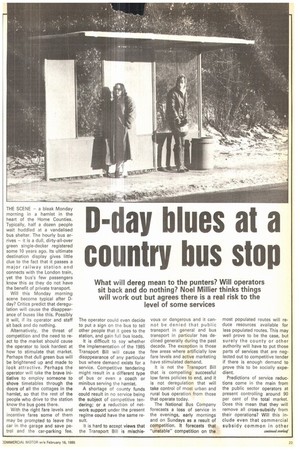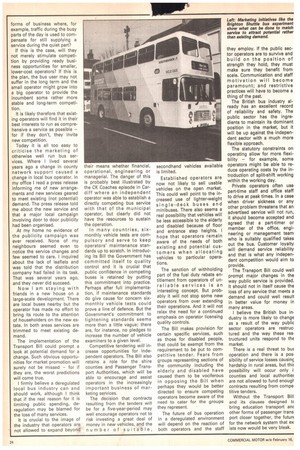-day blues at a country bus stop
Page 25

Page 26

If you've noticed an error in this article please click here to report it so we can fix it.
What will dereg mean to the punters? Will operators sit back and do nothing? Noel Millier thinks things will work out but agrees there is a real risk to the level of some services
THE SCENE — a bleak Monday morning in a hamlet in the heart of the Home Counties. Typically, half a dozen people wait huddled at a vandalised bus shelter. The hourly bus arrives — it is a dull, dirty-all-over green single-decker registered some 10 years ago. Its ultimate destination display gives little clue to the fact that it passes a major railway station and connects with the London train, yet the bus's few passengers know this as they do not have the benefit of private transport.
Will this Monday morning scene become typical after Dday? Critics predict that deregulation will cause the disappearance of buses like this. Possibly it will, if its operator and staff sit back and do nothing.
Alternatively, the threat of competition and the need to react to the market should cause the operator to look hardest at how to stimulate that market. Perhaps that dull green bus will be brightened up and made to look attractive. Perhaps the operator will take the brave initiative to employ someone to shove timetables through the doors of all the cottages in the hamlet, so that the rest of the people who drive to the station know the bus goes there.
With the right fare levels and incentive fares some of them may be prompted to leave the car in the garage and save petrol and the car-parking fee.
The operator could even decide to put a sign on the bus to tell other people that it goes to the station, and gain full bus loads.
It is difficult to say whether the implementation of the 1985 Transport Bill will cause the disappearance of any particular bus where demand exists for a service. Competitive tendering might result in a different type of bus or even a coach or minibus serving the hamlet.
A shortage of county funds could result in no service being the subject of competitive tendering; or a reduction of network support under the present regime could have the same result.
It is hard to accept views that the Transport Bill is mischie
vous or dangerous and it cannot be denied that public transport in general and bus transport in particular has declined generally during the past decade. The exception is those few areas where artificially low fare levels and active marketing have stimulated demand.
It is not the Transport Bill that is compelling successful low fares policies to end, and it is not deregulation that will take control of most urban and rural bus operation from those that operate today.
The National Bus Company forecasts a loss of service in the evenings, early mornings and on Sundays as a result of competition. It forecasts that "unstable" competition on the most populated routes will reduce resources available for less populated routes. This may well prove to be the case, but surely the county or other authority will have to put those parts of services that are neglected out to competitive tender if there is enough demand to prove this to be socially expedient.
Predictions of service reductions come in the main from the public sector operators at present controlling around 90 per cent of the total market. Does this mean that they will remove all cross-subsidy from their operations? Will this include even that commercial subsidy common in other
forms of business where, for example, traffic during the busy parts of the day is used to compensate for still supplying a service during the quiet part?
If this is the case, will they not merely stimulate competition by providing ready business opportunities for smaller, lower-cost operators? If this is the plan, the bus user may not suffer in the long term and the small operator might grow into a big operator to provide the incumbent some rather more stable and long-term competition, It is likely therefore that existing operators will find it in their best interests to run as comprehensive a service as possible — for if they don't, they invite new competition, Today it is all too easy to criticise the marketing of otherwise well run bus services. Where I lived several years ago a change in county network support caused a change in local bus operator. In my office I read a press release informing me of new arrangements and new services geared to meet existing (not potential) demand. The press release told me about the new service and that a major local campaign involving door to door publicity had been organised.
At my home no evidence of the publicity campaign was ever received. None of my neighbours seemed even to notice the service changes and few seemed to care. I inquired about the lack of leaflets and was told that the distribution company had failed in its task, That was several years ago, and they never did succeed.
Now I am staying with friends in a new house on a large-scale development. There are local buses nearby but the operator has made no effort to bring its route to the attention of householders on the new estate. In both areas services are trimmed to meet existing demand.
The implementation of the Transport Bill could prompt a look at potential demand for a change. Such obvious opportunities for market promotion will surely not be missed — for if they are, the worst predictions will come true.
I firmly believe a deregulated local bus industry can and should work, although I think that if the real reason for it is limiting public spending, deregulation may be blamed for the loss of many services.
It is crucial to the image of the industry that operators are not allowed to expand beyond their means whether financial, operational, engineering or managerial. The danger of this is probably best illustrated by the CK Coaches episode in Cardiff where an independent operator was able to establish a directly competing bus service with that of the municipal operator, but clearly did not have the resources to sustain the operation.
In many countries, sixmonthly vehicle tests are compulsory and serve to keep operators' maintenance standards up to scratch. In introducing its Bill the Government has committed itself to quality control and it is crucial that public confidence in competing buses is retained by putting this commitment into practice. Perhaps after full implementation, if maintenance standards do give cause for concern sixmonthly vehicle tests could prove a line of defence. But the Government's commitment to tightening standards seems more than a little vague; there are, for instance, no pledges to increase the number of vehicle examiners to a given level.
Competitive tendering will increase opportunities for independent operators. The Bill also retains a role for the shire counties and Passenger Transport Authorities, which will be able to encourage and assist operators in the increasingly important business of marketing services.
The decision that contracts resulting from the tenders will be for a five-year-period may well encourage operators not to risk investing a great deal of money in new vehicles, and the number of suitable, Established operators are now not likely to sell usable vehicles on the open market. This could well point to the increased use of lighter-weight single-deck buses and minibuses. There also seems a real possibility that vehicles will be less accessible to the elderly and disabled because of floor and entrance step heights. I hope that operators remain aware of the needs of both existing and potential customers when allocating vehicles to particular operations.
The sanction of withholding part of the fuel duty rebate entitlement from operators of unreliable services is an interesting concept. But probably it will not stop some new operators from over extending their operations. And it will not relax the need for a continued emphasis on operator licensing quality controls.
The Bill makes provision for certain specific services, such as those for disabled people, that could be exempt from the requirement to be put to competitive tender. Fears from groups representing sections of the community including the elderly and disabled have caused them to be vociferous in opposing the Bill when perhaps they would be better directed to ensure competing operators become aware of the need to cater for the groups they represent.
The future of bus operation in a deregulated environment will depend on the reaction of both operators and the staff they employ. If the public sector operators are to survive and build on the position of strength they hold, they must make sure they benefit from scale. Communication and staff motivation will become paramount; and restrictive practices will have to become a thing of the past.
The British bus industry already has an excellent record of reliability and safety. The public sector has the ingredients to maintain its dominant position in the market, but it will be up against the independent sector with a much more flexible approach.
The statutory constraints on operating allow for more flexibility — for example, some operators might be able to reduce operating costs by the introduction of split-shift working within the working day.
Private operators often use part-time staff and office staff to drive at peak times. In a case when driver sickness or any other problem threatens that an advertised service will not run, it should become accepted and agreed that a part-timer or member of the office, engineering or management team who is suitably qualified takes out the bus. Customer loyalty will demand service reliability and that is what any independent competition would aim to provide.
The Transport Bill could well prompt major changes in the way public service is provided. It should not in itself cause the loss of any service that meets a demand and could well result in better value for money in many areas.
I believe the British bus industry is more likely to change as a result of the way public sector operators are restructured and the way these restructured units respond to thE market.
There is a real threat to buE operation and there is a pos. sibility of service losses causinc hardship in rural areas, but thiE possibility will occur only counties and local authoritie:
are not allowed to fund enouglcontracts resulting from compe
titive tenders.
Without the Transport Bill and its clauses designed tc bring education transport anc other forms of passenger trans port closer together, the futurc for the network system that ex ists now would be very bleak.




























































































